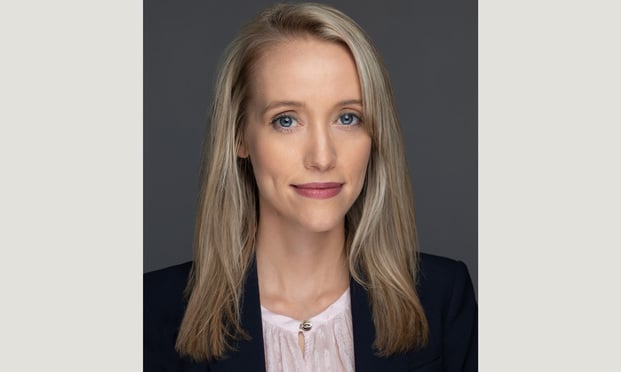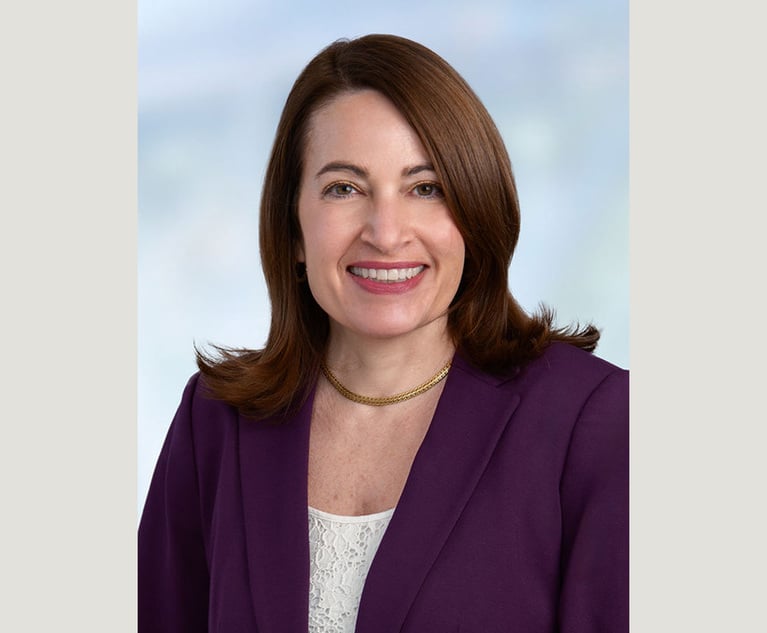Legal Exceptionalism in the Digital Age: 'To Run Fast and Win'
Essentially, automation and artificial intelligence have the ability to serve as lawyer equalizers. Today, and certainly in the future, the study posited, attorneys will be able to run fast and win (the case, the client, etc.).
July 20, 2020 at 12:35 PM
6 minute read
 Jennifer G. Betts shareholder with Ogletree, Deakins, Nash, Smoak & Stewart.
Jennifer G. Betts shareholder with Ogletree, Deakins, Nash, Smoak & Stewart.
A study was recently published on what makes a great lawyer in the age of artificial intelligence. The study suggested that a great lawyer, historically, was someone who had a strong memory, vast experience in a field and a sterling education. The distance runner rather than the sprinter. With the advent of artificial intelligence and digital solutions, the study's thesis was that attorneys will be able to, now, perform as top-level lawyers without the necessity to harness vast stores of historical information and sterling powers of memorization and training. Essentially, automation and artificial intelligence have the ability to serve as lawyer equalizers. Today, and certainly in the future, the study posited, attorneys will be able to run fast and win (the case, the client, etc.).
Whether one agrees with the study's conclusions about the impact of artificial intelligence on the legal profession or not, there can be no doubt that the combination of the COVID-19 crisis and the digital age has put enormous pressures on attorneys to transform. Replicating past ways of practice and historical delivery models are out of sync with the current environment. Technological advancements and the unique challenges and opportunities presented by the pandemic have altered, perhaps permanently, the key skill sets necessary for success in today's legal environment. Three key attributes of the future lawyer in the digital age are described below.
Adaptability
To be successful, attorneys functioning in today's new reality must be innovative and adaptable. In practice, this means that successful attorneys must be comfortable with abandoning historical methods of providing services and embrace innovative operating models and technologies. Either by necessity or by design, the practice of law is transforming through technology, project management, and new processes; attorneys who are unwilling or incapable of mastering the art of the pivot will find themselves falling behind.
A simple example is in COVID-era depositions. While some circumstances certainly dictate in-person depositions and attorneys must protect and advocate for their clients' interests by determining the best method to preserve testimony, remote depositions are here to stay. And an attorney who refuses to even consider a remote deposition through a videoconferencing platform will simply not be able to move cases forward in the current environment.
Less simple perhaps, but equally important, are other technology solutions widely available in the legal marketplace that streamline and change the way legal services can be performed and delivered. For example, contract lifecycle management technology is increasingly available and demanded by clients. Technology tools like smart intake forms, document generation tech, integrated e-signatures solutions, and automatic approval processes are available through end-to-end technology systems that allow legal providers to quicken the pace of contract drafting in a way that lowers cost, increases consistency, and frees up more experienced lawyers for higher level and more strategic legal services. In a time of change, attorneys who evaluate and implement this kind of technology in their practice will be able to deliver cost savings and improved performance to their clients.
Mastering Resources
The legal services industry is no longer simply about mastering and practicing law. Lawyers and law firms compete with one another as businesses and must demonstrate and deliver on not only the quality of their work, but the value of their services as well. Many refer to this as demonstrating the firm's (or attorney's) value proposition. In order to maximize the ability to deliver value and quality, and to be adaptable and flexible with respect to technological and process improvement changes, an attorney must be aware of what resources are available.
There is no doubt that this requires an investment of time and effort. Large law firms increasingly have knowledge management and legal project management departments. These internal experts maintain up-to-date knowledge about what is available on the marketplace and what tools the relevant law firm has at its disposal and is considering for future use. If an attorney has not already harnessed these resources, an easy way to learn what resources could assist the attorney's practice is simply to schedule a quarterly phone call with a key point of contact for an overview of available firm resources. Even better, if any tools or resources sound like they could drive value and efficiency, schedule a demonstration. Lawyers practicing at smaller firms or as part of an internal legal department may often have to do the legwork themselves to understand what tools are available. However, there are many resources through which to stay up-to-date, including legal technology newsletters and industry groups; staying aware and current can be as simple as spending thirty minutes a week reviewing relevant publications.
Inclusivity
Last but not least, lawyers or law firms that will thrive in the digital era are ones that embrace inclusivity. The legal profession is often viewed as falling behind other professions or industries with respect to diversity and inclusion. Lack of representation for females and minorities in law firm or in-house leadership and in day-to-day roles and opportunities is a continuing concern and necessary priority. And research consistently demonstrates that diversity and true inclusion can generate enhanced quality of services and better results—two deliverables necessity for a lawyer to thrive in this time of change. For example, diverse teams are often more innovative, creative, and collaborative than teams with members who share similar backgrounds. This allows for different perspectives relating to client issues and the process used to solve legal problems. Attorneys who focus on inclusivity and building strong relationships will be able to thrive in the digital age by listening to, and acting on, all of the voices of the team and the innovative problem-solving that inherently results from not only bringing everyone to the party, but asking everyone to dance.
Jenn Betts is a shareholder and co-chair of the technology practice group at Ogletree, Deakins, Nash, Smoak & Stewart, an international labor and employment law firm with offices in Pittsburgh and Philadelphia. She can be reached at [email protected].
This content has been archived. It is available through our partners, LexisNexis® and Bloomberg Law.
To view this content, please continue to their sites.
Not a Lexis Subscriber?
Subscribe Now
Not a Bloomberg Law Subscriber?
Subscribe Now
NOT FOR REPRINT
© 2025 ALM Global, LLC, All Rights Reserved. Request academic re-use from www.copyright.com. All other uses, submit a request to [email protected]. For more information visit Asset & Logo Licensing.
You Might Like
View All
Superior Court Directs Western Pa. Judge to Recuse From Case Over Business Ties to Defendant
3 minute read

Neighboring States Have Either Passed or Proposed Climate Superfund Laws—Is Pennsylvania Next?
7 minute readTrending Stories
Who Got The Work
J. Brugh Lower of Gibbons has entered an appearance for industrial equipment supplier Devco Corporation in a pending trademark infringement lawsuit. The suit, accusing the defendant of selling knock-off Graco products, was filed Dec. 18 in New Jersey District Court by Rivkin Radler on behalf of Graco Inc. and Graco Minnesota. The case, assigned to U.S. District Judge Zahid N. Quraishi, is 3:24-cv-11294, Graco Inc. et al v. Devco Corporation.
Who Got The Work
Rebecca Maller-Stein and Kent A. Yalowitz of Arnold & Porter Kaye Scholer have entered their appearances for Hanaco Venture Capital and its executives, Lior Prosor and David Frankel, in a pending securities lawsuit. The action, filed on Dec. 24 in New York Southern District Court by Zell, Aron & Co. on behalf of Goldeneye Advisors, accuses the defendants of negligently and fraudulently managing the plaintiff's $1 million investment. The case, assigned to U.S. District Judge Vernon S. Broderick, is 1:24-cv-09918, Goldeneye Advisors, LLC v. Hanaco Venture Capital, Ltd. et al.
Who Got The Work
Attorneys from A&O Shearman has stepped in as defense counsel for Toronto-Dominion Bank and other defendants in a pending securities class action. The suit, filed Dec. 11 in New York Southern District Court by Bleichmar Fonti & Auld, accuses the defendants of concealing the bank's 'pervasive' deficiencies in regards to its compliance with the Bank Secrecy Act and the quality of its anti-money laundering controls. The case, assigned to U.S. District Judge Arun Subramanian, is 1:24-cv-09445, Gonzalez v. The Toronto-Dominion Bank et al.
Who Got The Work
Crown Castle International, a Pennsylvania company providing shared communications infrastructure, has turned to Luke D. Wolf of Gordon Rees Scully Mansukhani to fend off a pending breach-of-contract lawsuit. The court action, filed Nov. 25 in Michigan Eastern District Court by Hooper Hathaway PC on behalf of The Town Residences LLC, accuses Crown Castle of failing to transfer approximately $30,000 in utility payments from T-Mobile in breach of a roof-top lease and assignment agreement. The case, assigned to U.S. District Judge Susan K. Declercq, is 2:24-cv-13131, The Town Residences LLC v. T-Mobile US, Inc. et al.
Who Got The Work
Wilfred P. Coronato and Daniel M. Schwartz of McCarter & English have stepped in as defense counsel to Electrolux Home Products Inc. in a pending product liability lawsuit. The court action, filed Nov. 26 in New York Eastern District Court by Poulos Lopiccolo PC and Nagel Rice LLP on behalf of David Stern, alleges that the defendant's refrigerators’ drawers and shelving repeatedly break and fall apart within months after purchase. The case, assigned to U.S. District Judge Joan M. Azrack, is 2:24-cv-08204, Stern v. Electrolux Home Products, Inc.
Featured Firms
Law Offices of Gary Martin Hays & Associates, P.C.
(470) 294-1674
Law Offices of Mark E. Salomone
(857) 444-6468
Smith & Hassler
(713) 739-1250






